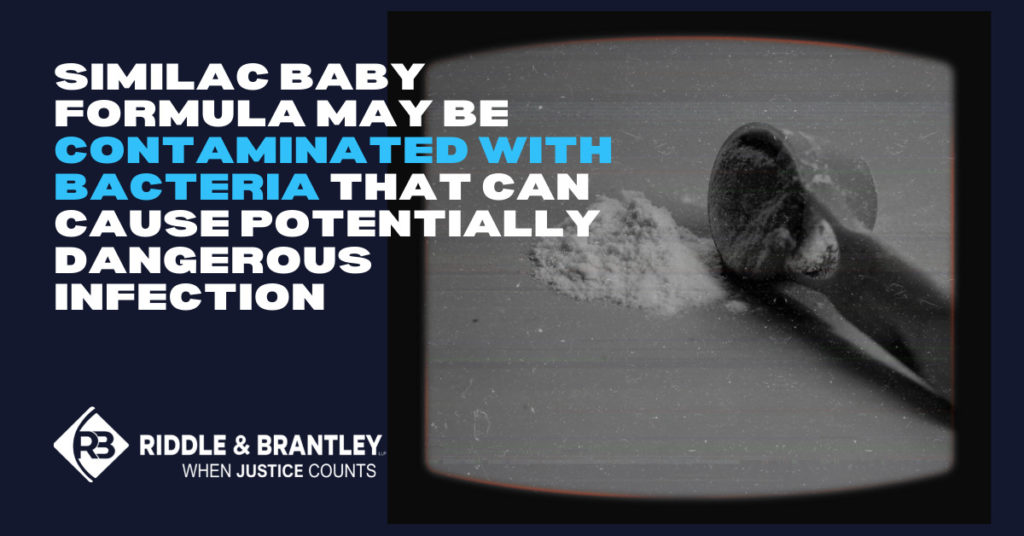Similac Baby Formula Linked to Bacterial Infection

Abbott Nutrition has ordered a recall on a new lot of their Similac baby formula after the FDA revealed a possible link between Similac formula and a dangerous bacterial infection in infants.
In
the statement released by the FDA, they indicated that four infants had become infected with
Cronobacter sakazakii. All of the infants had consumed powdered baby formula manufactured by Abbott Nutrition, with the most recent infection occurring after the child had consumed the Similac 60/40 formula.
Abbott Nutrition has now recalled one lot of their Similac 60/40 formula (lot code 27032K800) in addition to other lots of Similac, Alimentum, and EleCare formulas. However, the company continues to assure consumers that no distributed product has currently tested positive for
Cronobacter.
NOTE: These findings and the related recall are separate from allegations that Similac and other cow’s milk-based formulas are linked to necrotizing enterocolitis (NEC). Our firm is pursuing
baby formula NEC lawsuits in those cases.
In February 2022, the FDA
advised consumers “to avoid using Similac, Alimentum or EleCare powdered infant formulas if the first two digits of the code are 22 through 37; the code on the container contains K8, SH or Z2; the expiration date is April 1, 2022, or later.”
This recommendation immediately followed the hospitalization of four infants, three with an infection of
Cronobacter sakazakii and one with an infection of Salmonella. The FDA found that the infants had consumed powdered formulas produced in Abbot Nutrition’s Sturgis, MI facility in all these cases.
Abbott Nutrition’s Response
Following the launch of the FDA investigation, Abbott Nutrition put out a
press release detailing their own findings and decisions for recalls. They state that during a “routine testing” of their Sturgis, MI plant, they “found evidence of
Cronobacter sakazakii in the plant in non-product contact areas.”
They reassured consumers that their testing had yet to reveal contamination in the formula itself but said that investigations were still ongoing.
The discovery of
Cronobacter within the facility is what led to the recall of Similac and other powdered formulas. However, both Abbott and the FDA have stated that the risk of contamination does not extend to liquid formulas.
What are the Symptoms of Cronobacter Infection?
Cronobacter infections carry a risk of sepsis and meningitis. Symptoms of these dangerous conditions may include (but are not limited to):
- Lack of appetite
- Irritability
- Temperature changes
- Jaundice
- Difficulty breathing.
If your child is displaying any of these symptoms, you should
contact your healthcare provider immediately, as sepsis and meningitis can be extremely dangerous and potentially fatal, especially for infants. In addition, if your child has recently consumed one of the recalled formulas, you should make sure to communicate this with your healthcare provider.
These discoveries come at a difficult time for consumers as the United States faces a shortage of infant formula. As a result, the FDA has made it clear that consumers only need to avoid the specific formula batches outlined in the recalls and should continue to use formulas that are not included in the recall.
They also go on to warn consumers not to dilute formula or attempt to make their own, as this can lead to nutritional deficiencies and other health problems.
If your child’s formula is one of the recalled brands or lots, you should contact your pediatrician or other healthcare providers for advice on alternative feeding options.
In related news, Similac, Enfamil and other brands of cow’s milk-based baby formula have been linked to a
potentially increased risk of necrotizing enterocolitis (NEC) in infants. These manufacturers face a growing number of
baby formula lawsuits alleging that they failed to warn consumers of the potential risk.
Our attorneys are actively investigating these claims. If your infant has been fed a cow’s milk-based baby formula like Similac or Enfamil while in the hospital, and was later diagnosed with NEC, you deserve justice — and may be entitled to compensation. Please call
1-800-525-7111 today for a free, no-obligation consultation.
Justice Counts.
 Abbott Nutrition has ordered a recall on a new lot of their Similac baby formula after the FDA revealed a possible link between Similac formula and a dangerous bacterial infection in infants.
In the statement released by the FDA, they indicated that four infants had become infected with Cronobacter sakazakii. All of the infants had consumed powdered baby formula manufactured by Abbott Nutrition, with the most recent infection occurring after the child had consumed the Similac 60/40 formula.
Abbott Nutrition has now recalled one lot of their Similac 60/40 formula (lot code 27032K800) in addition to other lots of Similac, Alimentum, and EleCare formulas. However, the company continues to assure consumers that no distributed product has currently tested positive for Cronobacter.
NOTE: These findings and the related recall are separate from allegations that Similac and other cow’s milk-based formulas are linked to necrotizing enterocolitis (NEC). Our firm is pursuing baby formula NEC lawsuits in those cases.
Abbott Nutrition has ordered a recall on a new lot of their Similac baby formula after the FDA revealed a possible link between Similac formula and a dangerous bacterial infection in infants.
In the statement released by the FDA, they indicated that four infants had become infected with Cronobacter sakazakii. All of the infants had consumed powdered baby formula manufactured by Abbott Nutrition, with the most recent infection occurring after the child had consumed the Similac 60/40 formula.
Abbott Nutrition has now recalled one lot of their Similac 60/40 formula (lot code 27032K800) in addition to other lots of Similac, Alimentum, and EleCare formulas. However, the company continues to assure consumers that no distributed product has currently tested positive for Cronobacter.
NOTE: These findings and the related recall are separate from allegations that Similac and other cow’s milk-based formulas are linked to necrotizing enterocolitis (NEC). Our firm is pursuing baby formula NEC lawsuits in those cases.